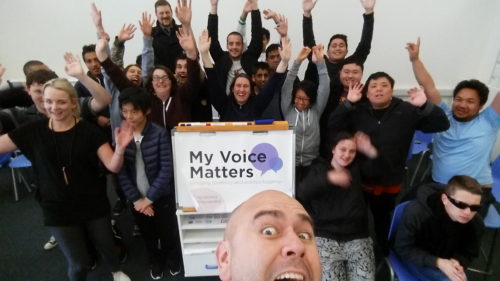
Women in New Zealand started voting 124 years ago but it’s been only three years since Telephone Voting was introduced for the visually impaired or for those with other physical disabilities.
“We all have the right to a secret vote, so if you can’t mark the paper without assistance, you can vote by telephone which was introduced last election,” says Ezekiel Robson as he familiarises a group of around 30 students with varying disabilities at the Sommerville Special School.
The school caters for 200 special needs students and 34 classes that includes satellite classes in different local schools like Riverhills School, Edgewater College and Howick Intermediate has recently relocated to Pakuranga.
As part of a community project, Mr Robson is taking the young adults through the paces of voting and giving them a perfect idea of the voting process with a role play.
“The Electoral Commission has a range of ways it can help people with different access needs,” he says as he talks about staff assisted voting and postal votes.
Visually impaired himself, Mr Robson is passionate about bringing disability and politics together. Keen to see that disabled people are more aware, informed, and visible, he plays a key role in the non profit organisation My Voice Matters.
Mr Robson has been travelling throughout Auckland addressing disabled groups and encouraging them to exercise their right to vote.
“There is a Takeaway vote-like McDonald’s,” he says trying to grab the interest of the students who are easily distracted.
“It’s not quite as tasty but it’s healthier.
“It’s a special vote. If you have anxiety issues and are not comfortable being around people, you could ask someone close to you or a family member to pick up the voting paper for you.
“The support person can go to a voting place with your verbal permission and collect the voting paper for those who are unable to visit a public place. You can pick it up from anywhere in the country and drop it back to any polling booth before September 23.”
Fighting for equal opportunities, Mr Robson says that he contested the Manurewa Local Board elections in 2016 in order to “educate the politicians that people with disability matter”.
Interestingly he says that it was Times Newspapers <ITALIC> that had asked the readers to come up with possible questions for previous Mayoral elections that proved to be a turning point for him.
“I was really thrilled when my question about how responsive they are to disability issues was selected to be asked at an election debate.
“But sadly none of the candidates had any idea about what they would do. Except one, who was really vague about it.”
He says that according to Stats NZ, in 2013, 24 per cent of the New Zealand population identified as disabled, a total of 1.1 million people.
“If we all voted for one party, they would be government and would not need any coalition partners,” he says regarding the power of the disabled voting block.










